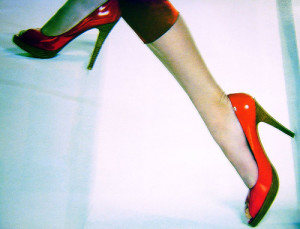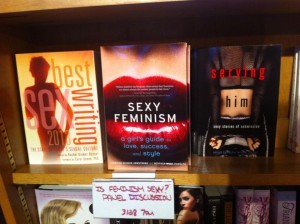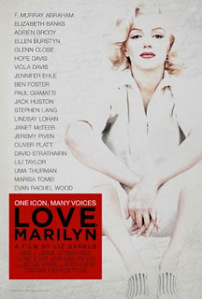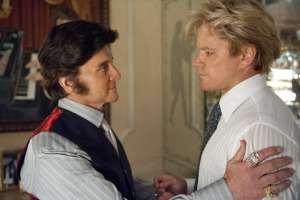 Launching your own blog or online magazine provides one of the best venues for you to hone and showcase your own vision, voice, and views. (Like we do here!) In short, it’s a way to make an outspoken lady’s dreams come true, almost instantly, at very little cost (if you do it right). It might not make you rich, but it could make you a known rabble-rouser, promote your soapbox issue of choice, give you a chance to build a community of like-minded women, look cool on your resume, and even lead to a book deal. (Look for our book, Sexy Feminism, out next year.)
Launching your own blog or online magazine provides one of the best venues for you to hone and showcase your own vision, voice, and views. (Like we do here!) In short, it’s a way to make an outspoken lady’s dreams come true, almost instantly, at very little cost (if you do it right). It might not make you rich, but it could make you a known rabble-rouser, promote your soapbox issue of choice, give you a chance to build a community of like-minded women, look cool on your resume, and even lead to a book deal. (Look for our book, Sexy Feminism, out next year.)
It did all of that for us when we started SexyFeminist.com together six years ago. But it also caused us a lot of headaches we didn’t anticipate. We want to stop you from going through what we did, so we’re sharing what we learned. Here are our top 10 things you shouldn’t do while starting a website—and remedies for making them right:
1. Don’t get ahead of yourselves. In the early stages of planning our launch, we spent more time than we’d like to admit envisioning the outfits we would wear on the Today show when they inevitably called us for an interview about our groundbreaking vision for an edgy women’s site. While we were right that we were a little ahead of our time, we were wrong to think it mattered where we bought our power suits. And to think any media outlet was going to magically show up at our door begging to cover us.
2. Don’t set unrealistic publishing goals that will discourage you and stress you out. Unless you’re independently wealthy or have financial backing, you probably have at least a day job, if not a day job plus other projects plus a personal life plus a basic human need to eat and sleep. At the beginning, we considered such absurd ideas as having at least a post a day; as things progressed we realized we couldn’t even handle a post a week at certain times in our lives. (Like when we were working full time while writing books, planning weddings, having babies, or running marathons.) Now that we’re freelancers, we can handle a few posts a week, but our disillusionment back in the early days almost made us quit. Just blog when you can blog!
3. Don’t think you have to do everything yourselves. The happy/sad truth (happy for you, sad for writers) is that a lot of writers will work for free under the right circumstances. Guilt your friends into writing. Give writers you know a chance to cover topics they don’t usually get to but feel passionate about. Hire “interns,” who are really just young people who will work for free, and give them a chance to do the kind of work they need to build their resumes. We love our interns.
4. Don’t set up your blog on unfamiliar software, particularly if it doesn’t have a tech support line. We’re on WordPress now and adore its user-friendliness. This was not the case on the first platform we used, and we paid for it. More than once, we actually “broke” our own site and spent days wondering if all our hard work would ever reappear online. There’s no excuse for this, especially with the software available now.
5. Don’t get too caught up in design. We hired a friend’s husband at a very reasonable price to design our now-gorgeous site. But if you don’t know someone who can do this, don’t worry too much. Pick one of the many great templates available online and start blogging. If you eventually make enough money on an ad service (think: Google ads, BlogHer), you can hire someone to make you a logo, but don’t go crazy. No one cares that much about your aesthetics if you’ve got great content.
6. Don’t think you know anything about tax law.
You’ve done your research; you’ve looked up every official IRS document applicable to starting a small business (which is what you’re doing if you plan to ever run an ad on your website) and think you’ve got it covered. Think again. Tax laws are multilayered, complex, confusing beasts filled with loopholes and special circumstances that could end up costing you thousands of dollars or triggering an audit. Starting your own website is hard enough without a visit from the IRS.
If funds for a proper tax attorney are unavailable (and let’s assume that), worry not. There are many resources for small businesses to get the expert input they need. A favorite—and savior—of ours isSCORE. The free, nonprofit service pairs newbies like you with mentors—attorneys, accountants, lawyers, CEOs, and scads of extremely knowledgeable and caring individuals who are, let’s face it, way smarter than you about this stuff. Say you have a question, such as, “Should I incorporate my two-person, content-based, non-retail, not-profitable website in the state of California?” They will kindly tell you it might cost you a fee of around $350 and an unexpected annual tax bill of around $800. We wish we’d talked to them before we found this out the hard way and went to them to fix it.
7. Don’t have a nebulous concept that can’t be articulated in a clear title.
We’re writers. We like interesting words. This is a great asset as you create the content for your new website, but it can be a liability when you complete the simple, essential task of naming it. Before you buy a domain, order 2,000 business cards and customize cute T-shirts with your new site’s name emblazoned on them, be certain that you’ve chosen wisely. And wisely means that the name of your website needs to explain what said website contains. Personal blogs can be nonsensical, but if you want people to find your site and remember its content, “simple, straightforward, and clear” is your mantra.
When we first launched our “women’s lifestyle with a feminist twist” website, we called it Sirens, inspired by strong, iconic female historical characters. Now it’s called The Sexy Feminist. Which of these actually says anything about the content of the site? It took us six years to get it right.
8. Master self-promotion—the right kind.
Many creative types—writers especially—are introverted, preferring to practice their craft without much fanfare. To put it frankly: We can suck at self-promotion. But it’s more necessary now than ever, especially if you’re running a site you hope other people will read. And you don’t need an elaborate ad campaign to do it. Here are just three steps that will guarantee spikes in traffic:
- Make friends with other bloggers and offer to cross-post items.
- Email relevant content links to bigger sites in your field suggesting they link to your story.
- Tweet everything—not just your new content links, but 120-character quips about news and thoughts relevant to your website’s focus. Make Pinterest boards thematically linked to your content.
9. Know what your money is buying.
Startup money is scarce, especially for those of us not inventing the next Google. If you don’t plan to make a lot of money from your website (and most don’t), then you needn’t stress about raising seed money for startup. You won’t need much anyway. You have to buy a domain name and a hosting package, then just put the site up, which can be done using free software such as WordPress.
A note on web developers: Bless them, but some create more problems than they solve, especially if they are the only ones who can solve the problems they themselves create. Make sure you really,really need any service before investing in it.
10. Don’t make things harder on yourself than you need to. This is supposed to be at least a little fun, right?
Please see all of the above.

 Hello! I am honored to now be posting on The Sexy Feminist from my own byline. You may recognize my name from a few guest posts that have gone up over the past two months, and I look forward to contributing my voice along with Jennifer, Heather, and the entire Sexy Feminist community. I would like to begin by writing about why, as a man, I am excited and honored to contribute here. I have had a lot of fun researching and writing my previous posts, but my feminism is something I take rather seriously. I am certainly not alone as a male feminist, but the phrase “male feminist” comes off as strange or oxymoronic to many. I’m here to express why that point of view could not be further from the truth.
Hello! I am honored to now be posting on The Sexy Feminist from my own byline. You may recognize my name from a few guest posts that have gone up over the past two months, and I look forward to contributing my voice along with Jennifer, Heather, and the entire Sexy Feminist community. I would like to begin by writing about why, as a man, I am excited and honored to contribute here. I have had a lot of fun researching and writing my previous posts, but my feminism is something I take rather seriously. I am certainly not alone as a male feminist, but the phrase “male feminist” comes off as strange or oxymoronic to many. I’m here to express why that point of view could not be further from the truth. Looking at the painting, “Girl Under the Taliban,” (left) by Hangama Amiri is like being slapped across the face with a reality check. In it, a young woman sears a determined stare into the viewer’s mind with one eye while the other burns with fire. She’s clutching a textbook in one hand and a burqa in the other. It assaults you with its literal message of oppression, but confounds even more with its rich complexity. It’s the story of Nargis, a 13-year-old Afghan girl banned from seeking education under the Taliban. It is not a unique story, but it’s one that isn’t being told nearly enough.
Looking at the painting, “Girl Under the Taliban,” (left) by Hangama Amiri is like being slapped across the face with a reality check. In it, a young woman sears a determined stare into the viewer’s mind with one eye while the other burns with fire. She’s clutching a textbook in one hand and a burqa in the other. It assaults you with its literal message of oppression, but confounds even more with its rich complexity. It’s the story of Nargis, a 13-year-old Afghan girl banned from seeking education under the Taliban. It is not a unique story, but it’s one that isn’t being told nearly enough. Canadian Judge Doesn’t Send Rapist To Jail Because “Sex Was In The Air”: In a case where the woman was wearing (gasp!) a tube top with no bra, high heels, and “plenty of makeup,” it was more OK for the man she was with, Kenneth Rhodes, to force intercourse with her on a dark highway. At least that’s what Queen’s Bench Justice Robert Dewar decided. Poor guy; he was just a “clumsy Don Juan.” He sure was clumsy — he left a permanent scar on the victim’s knee from the the attack. But “Protection of society is not advanced one iota by putting Mr. Rhodes in jail,” Dewar said. That’s where he is oh, so wrong.
Canadian Judge Doesn’t Send Rapist To Jail Because “Sex Was In The Air”: In a case where the woman was wearing (gasp!) a tube top with no bra, high heels, and “plenty of makeup,” it was more OK for the man she was with, Kenneth Rhodes, to force intercourse with her on a dark highway. At least that’s what Queen’s Bench Justice Robert Dewar decided. Poor guy; he was just a “clumsy Don Juan.” He sure was clumsy — he left a permanent scar on the victim’s knee from the the attack. But “Protection of society is not advanced one iota by putting Mr. Rhodes in jail,” Dewar said. That’s where he is oh, so wrong. Last night, I had the honor of moderating a panel filled with some of my favorite feminist ladies discussing the big issues of the day (that’s Lean In and gay marriage to you) at Word Bookstore in Brooklyn to promote Sexy Feminism. We had four spectacular women from different parts of the femi-sphere: Rachel Kramer Bussel, the lady to go to for great sex writing and erotica anthologies; Britt Gambino, Sexy Feminist’s gay-lady contributor (as she likes to call herself); Julie Gerstein, an editor at The Frisky; and Jamia Wilson, a media activist. You never really know how panels full of people who have never met will go, especially on such hot topics. But I was blown away by the level of discourse — yes, it was so smart that it was discourse! — as well as the fact that the discussion was entertaining and engaging without being any sort of fight. I wish I’d recorded the entire thing so everyone could see how amazing it was, but instead I’ll give you a few highlights of what I learned:
Last night, I had the honor of moderating a panel filled with some of my favorite feminist ladies discussing the big issues of the day (that’s Lean In and gay marriage to you) at Word Bookstore in Brooklyn to promote Sexy Feminism. We had four spectacular women from different parts of the femi-sphere: Rachel Kramer Bussel, the lady to go to for great sex writing and erotica anthologies; Britt Gambino, Sexy Feminist’s gay-lady contributor (as she likes to call herself); Julie Gerstein, an editor at The Frisky; and Jamia Wilson, a media activist. You never really know how panels full of people who have never met will go, especially on such hot topics. But I was blown away by the level of discourse — yes, it was so smart that it was discourse! — as well as the fact that the discussion was entertaining and engaging without being any sort of fight. I wish I’d recorded the entire thing so everyone could see how amazing it was, but instead I’ll give you a few highlights of what I learned: Given the early coverage before the debut of Comedy Central’s Inside Amy Schumer this spring, I figured we were in for another dirty-girl comedian — Schumer was most often compared to Whitney Cummings and Sarah Silverman. I don’t dislike either of those ladies, but both of them, when at their best, retain the whiff of women trying to make it in a man’s comedy world. Of course, it is a man’s comedy world, and I can’t blame them, and I loooved every bit of the shock value of The Sarah Silverman Program. (I also happen to enjoy the show Cummings co-created, 2 Broke Girls. We won’t talk about Whitney.) Cummings and Silverman do the comedy equivalent of business women wearing hyper-masculine, shoulder-padded suits in the ’80s as they fought their way to boardroom levels: They made it in an astonishingly male-dominated profession by out-boying the boys.
Given the early coverage before the debut of Comedy Central’s Inside Amy Schumer this spring, I figured we were in for another dirty-girl comedian — Schumer was most often compared to Whitney Cummings and Sarah Silverman. I don’t dislike either of those ladies, but both of them, when at their best, retain the whiff of women trying to make it in a man’s comedy world. Of course, it is a man’s comedy world, and I can’t blame them, and I loooved every bit of the shock value of The Sarah Silverman Program. (I also happen to enjoy the show Cummings co-created, 2 Broke Girls. We won’t talk about Whitney.) Cummings and Silverman do the comedy equivalent of business women wearing hyper-masculine, shoulder-padded suits in the ’80s as they fought their way to boardroom levels: They made it in an astonishingly male-dominated profession by out-boying the boys. Talented Friend of Sexy Feminist Lauren Ramidrew this tremendous illustration of a Soul Train dancer (don’t you want to frame it and put it in some inspirational place in your apartment?) in homage to the women she loves to watch on the quintessential ’70s dance show. She wrote us a guest post about what inspired her.
Talented Friend of Sexy Feminist Lauren Ramidrew this tremendous illustration of a Soul Train dancer (don’t you want to frame it and put it in some inspirational place in your apartment?) in homage to the women she loves to watch on the quintessential ’70s dance show. She wrote us a guest post about what inspired her.

 Pop quiz: Whom is the show Game of Thrones“made” for?
Pop quiz: Whom is the show Game of Thrones“made” for?

 We’ve wanted to be Julie Zeilinger when we grow up ever since she launched the feminism-for-teens website
We’ve wanted to be Julie Zeilinger when we grow up ever since she launched the feminism-for-teens website  Launching your own blog or online magazine provides one of the best venues for you to hone and showcase your own vision, voice, and views. (Like we do here!) In short, it’s a way to make an outspoken lady’s dreams come true, almost instantly, at very little cost (if you do it right). It might not make you rich, but it could make you a known rabble-rouser, promote your soapbox issue of choice, give you a chance to build a community of like-minded women, look cool on your resume, and even lead to a book deal. (Look for our book, Sexy Feminism, out next year.)
Launching your own blog or online magazine provides one of the best venues for you to hone and showcase your own vision, voice, and views. (Like we do here!) In short, it’s a way to make an outspoken lady’s dreams come true, almost instantly, at very little cost (if you do it right). It might not make you rich, but it could make you a known rabble-rouser, promote your soapbox issue of choice, give you a chance to build a community of like-minded women, look cool on your resume, and even lead to a book deal. (Look for our book, Sexy Feminism, out next year.)